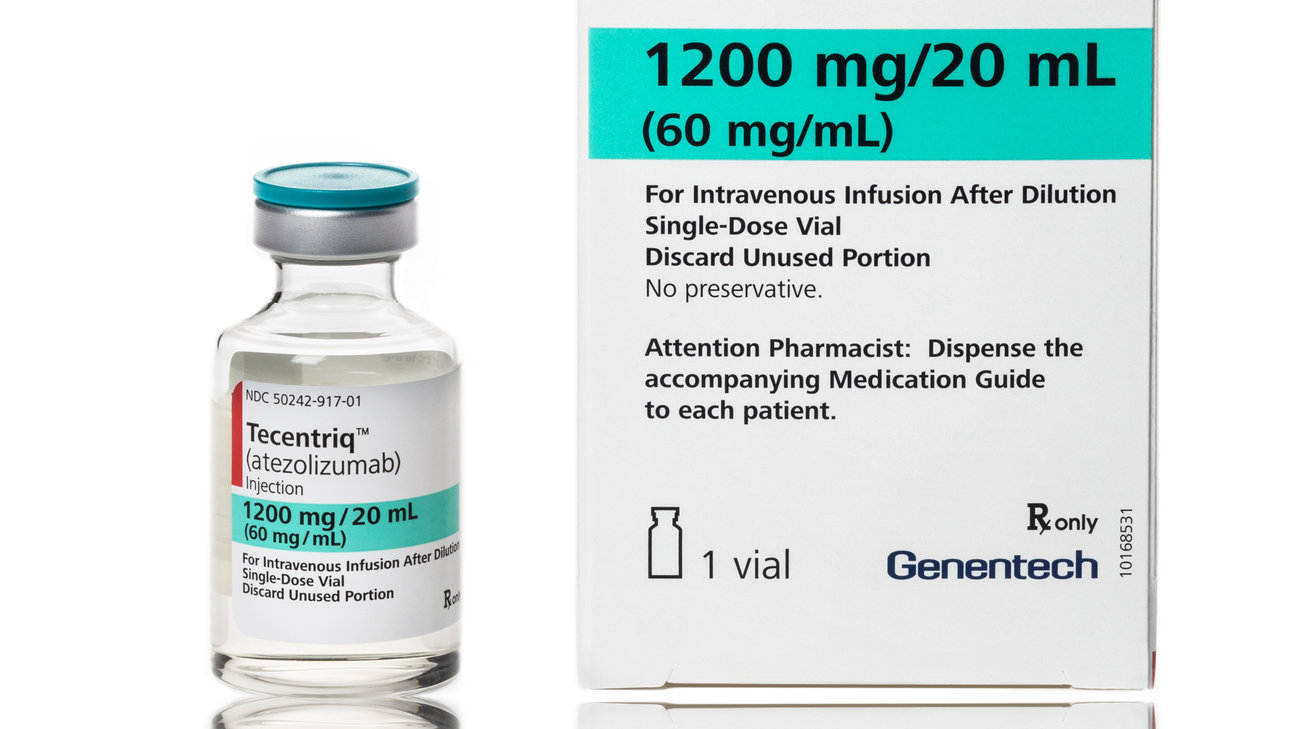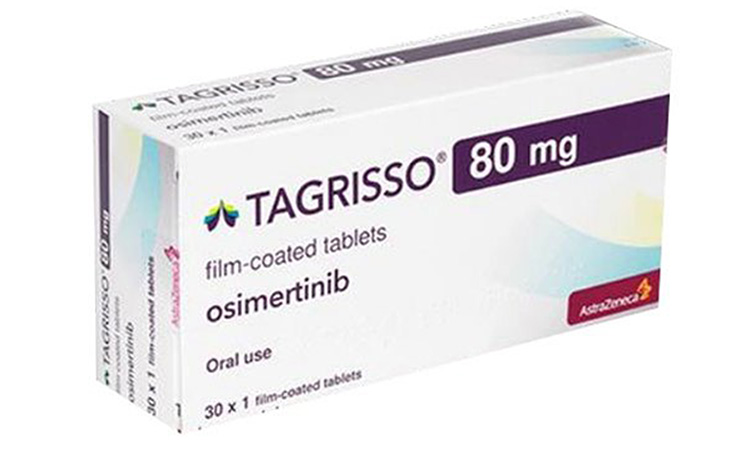Tecentriq (Atezolizumab) vs Tagrisso (osimertinib)
Tecentriq (Atezolizumab) vs Tagrisso (osimertinib)
Tecentriq (Atezolizumab) is an immune checkpoint inhibitor that targets the PD-L1 protein, used primarily for treating certain types of urinary bladder cancer, non-small cell lung cancer (NSCLC), and triple-negative breast cancer. Tagrisso (Osimertinib) is a third-generation epidermal growth factor receptor (EGFR) tyrosine kinase inhibitor designed specifically for NSCLC patients with specific EGFR mutations. The choice between Tecentriq and Tagrisso would depend on the patient's specific cancer type, genetic mutation status, and overall health, and should be made in consultation with an oncologist who can evaluate the suitability of each medication based on the patient's individual condition.
Difference between Tecentriq and Tagrisso
| Metric | Tecentriq (Atezolizumab) | Tagrisso (osimertinib) |
|---|---|---|
| Generic name | Atezolizumab | Osimertinib |
| Indications | Urothelial carcinoma, non-small cell lung cancer, triple-negative breast cancer | Non-small cell lung cancer with specific EGFR mutations |
| Mechanism of action | PD-L1 inhibitor, immune checkpoint inhibitor | EGFR tyrosine kinase inhibitor |
| Brand names | Tecentriq | Tagrisso |
| Administrative route | Intravenous infusion | Oral |
| Side effects | Fatigue, decreased appetite, nausea, urinary tract infections, fever, etc. | Diarrhea, rash, dry skin, nail toxicity, stomatitis, etc. |
| Contraindications | None known specifically, but should be avoided in patients with severe hypersensitivity to atezolizumab or its excipients | Patients with hypersensitivity to osimertinib or any excipients |
| Drug class | Monoclonal antibody, immune checkpoint inhibitor | Tyrosine kinase inhibitor |
| Manufacturer | Genentech (Roche) | AstraZeneca |
Efficacy
Tecentriq (Atezolizumab) Efficacy in Lung Cancer
Tecentriq (Atezolizumab) is an immune checkpoint inhibitor that has shown efficacy in the treatment of certain types of lung cancer. Specifically, it is approved for use in patients with previously treated metastatic non-small cell lung cancer (NSCLC) and as a first-line treatment for patients with metastatic NSCLC whose tumors express PD-L1, without EGFR or ALK tumor mutations. Clinical trials have demonstrated that Tecentriq can extend overall survival compared to chemotherapy in these patient populations. The drug works by blocking the PD-L1 protein on tumor cells, thereby enhancing the ability of the immune system to detect and fight cancer cells.
Tagrisso (Osimertinib) Efficacy in Lung Cancer
Tagrisso (Osimertinib) is a third-generation, irreversible epidermal growth factor receptor (EGFR) tyrosine kinase inhibitor that has been found to be effective in the treatment of NSCLC with specific EGFR mutations. It is approved for the first-line treatment of patients with metastatic NSCLC whose tumors have exon 19 deletions or exon 21 L858R mutations, as detected by an FDA-approved test. In clinical studies, Tagrisso has shown a significant improvement in progression-free survival compared to standard EGFR tyrosine kinase inhibitors. Additionally, Tagrisso has shown efficacy in patients with central nervous system metastases and is generally well-tolerated with a manageable side effect profile.
Comparative Efficacy in Lung Cancer Treatment
While both Tecentriq and Tagrisso are used in the treatment of NSCLC, their efficacy is dependent on different biomarkers and genetic profiles of the cancer. Tecentriq is most effective in patients whose tumors express high levels of PD-L1 and who do not have EGFR or ALK mutations. On the other hand, Tagrisso is specifically designed for tumors with certain EGFR mutations. The selection of either drug for a patient with NSCLC is therefore highly personalized and based on the molecular characteristics of the tumor. When used in their respective patient populations, both drugs have shown a significant improvement in outcomes compared to traditional chemotherapy.
Conclusion on Tecentriq and Tagrisso in Lung Cancer
In conclusion, Tecentriq and Tagrisso have each changed the landscape of lung cancer treatment by offering targeted therapies that improve survival and quality of life for patients with specific tumor profiles. Their efficacy highlights the importance of molecular testing in lung cancer to ensure that patients receive the most appropriate and effective treatment. As research continues, these medicines may be used in combination with other therapies or in different settings to further improve outcomes for patients with lung cancer.
Regulatory Agency Approvals
Tecentriq
-
European Medical Agency (EMA), European Union

-
Food and Drug Administration (FDA), USA

-
Health Canada

-
Pharmaceuticals and Medical Devices Agency (PMDA), Japan

-
Therapeutic Goods Administration (TGA), Australia

-
Medsafe (NZ)

Tagrisso
-
European Medical Agency (EMA), European Union

-
Food and Drug Administration (FDA), USA

-
Health Canada

-
Therapeutic Goods Administration (TGA), Australia

-
Medsafe (NZ)

Access Tecentriq or Tagrisso today
If Tecentriq or Tagrisso are not approved or available in your country (e.g. due to supply issues), you can access them via Everyone.org.
How it works

Make an enquiry
Choose the medicine you want to buy, answer a couple of questions, and upload your prescription to speed things up. We’ll get back to you within 24 hours.


Make an enquiry
Choose the medicine you want to buy, answer a couple of questions, and upload your prescription to speed things up. We’ll get back to you within 24 hours.


Breeze through the paperwork
We'll guide you through the required documents for importing unapproved medicine, ensuring you have all the necessary information.


Get a personalized quote
We’ll prepare a quote for you, including medicine costs and any shipping, administrative, or import fees that may apply.


Receive your medicine
Accept the quote and we’ll handle the rest - sourcing and safely delivering your medicine.

Some text on this page has been automatically generated. Speak to your physician before you start a new treatment or medication.
Let's talk
If you have any questions, call us or send us a message through WhatsApp or email:
Contact us




